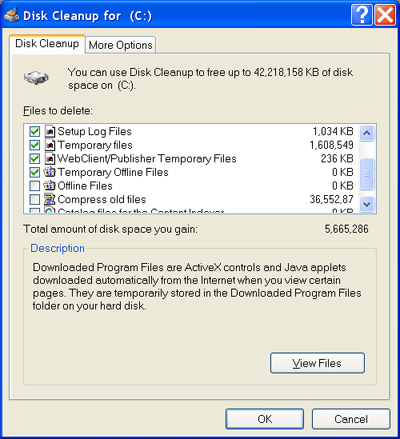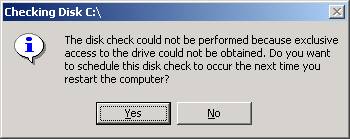| |
|
| Tune Up Your Computer |
.. Geoff Bannoff, updated July 9/09 |
Over time, your computer hard disk gets fragmented, cluttered, and can
develop errors (from crashes or improper shutdowns). Here is what you can do to
tune up your computer, to make it run faster.
If you are confused about any of these, please ask Geoff or Daniel to
help you out.
Log off from Windows when you leave the office. Logging off
cleans up Windows memory, so your machine runs faster when you log back on.
During the logoff process, all your documents, mail, desktop, and a few other
items, are copied to your local server. This allows us to rebuild your computer
when the hard disk fails. (We have 2 or 3 hard disk failures each year.)
Leave the computer running overnight as we have virus scan and disk
defragmentation programs that run about midnight. You can turn off the monitor
to save electricity if you wish, although most monitors automatically go into
low-power 'sleep' mode.
Outlook Express - Once a month, delete all your old "Sent
Mail"--say everything more than 4 months old. (This doesn't actually delete
it--it just moves it to the Deleted Items folder.)
This is also a good time to delete old items in your inbox. You don't
really need to keep emails more than a few months old, do you?
- Then, delete all the old "Deleted Items".
- Then click
File
> Folders > Compact All Folders
All your mailboxes get backed up to your local server every time you log
on or log off from Windows. This transfer of old mail takes a lot of time, so
cleaning up Outlook Express makde the log on/log of processes faster for you.
It also saves server space.
If you don't do this maintenance regularly, eventually Outlook Express's
mailboxes will get corrupted. Then you will be unable to open mail, or Outlook
Express will crash repeatedly, or you will lose mail. Sometimes we can fix
this, and sometimes we can't, so it's better to keep your mailbox
maintained.
Clean up your hard disk - Click Start >
Accessories > System tools > Disk cleanup
This program spends a few
minutes analyzing your disk, then presents you with some options.
Check
these items: Downloaded program files, Temporary internet files, Recycle bin,
Setup log files, Temporary files, Temporary offline files
Leave un-checked:
Compress old files, and anything else.
Click "OK" |
 |
Defragment your hard disk- Start > Run >
\winutils\jkdefrag.exe
The defragmentation process will take about 30
minutes. You can use your computer in the meantime. We try to schedule a disk
deframentation weekly on all computers. If it's not in your 'Scheduled Tasks',
please all Geoff or Daniel to set it up.
 Check disk- Click on "My Computer", right click on drive C.
Click Properties > Tools > Error Checking > Check Now. Check both
boxes (Automatically fix errors; and Scan for and attempt recover of bad
sectors). Click Start. You will get this box.
Check disk- Click on "My Computer", right click on drive C.
Click Properties > Tools > Error Checking > Check Now. Check both
boxes (Automatically fix errors; and Scan for and attempt recover of bad
sectors). Click Start. You will get this box.
Click yes. Restart your computer. The disk check will take about 20
minutes. You have to wait until it is finished before you can use your
computer. Windows XP is very good at handling disk errors, so you don't need to
do this more than once every few months.
It would be wonderful if we could automatically schedule a disk check,
but there does not seem to be a way to do this.
Defragment the paging and registry files- Run
c:\Winutils\pagedefrg.exe
- Set it to defragment your system files on every
boot.
Automatic Updates keep your computer up to date with security
patches. Control Panel > System > Automatic Updates. Click "Automatically
download the updates and install them on the schedule that I specify."
Windows Update - Click on Windows Update. (If that doesn't work,
start Internet Explorer, click on Tools > Windows Update). Click on Product
Updates. Select all Critical Updates. Some of the other items under Recommended
Updates or Picks of the Month are useful--some are not. Ask Geoff or Daniel if
you are confused.
Remove unnecessary programs - Click on Start > Control Panel
> Add/Remove Programs. Delete any games or other junk cluttering up the
computer.
Here is what Geoff or Daniel can do to further check over your
computer:
Scrutinize programs that automatically start. Run
c:\winutils\Autoruns.exe
Autoruns looks in all the locations where programs
are set to automatically start. Some of them don't need to be there--but be
careful that you know what you are doing so you don't disable something
vital.
Check the event log - to see if any problems are slowing the
computer. Right click on My Computer > Manage > Event Log > System.
BIOS updates, Device Driver Updates - check the vendor website
for the specific computer. If the computer doesn't work the way it ought to,
these updates often help. Driver updates, especially video driver updates, can
cause the machine to crash. So you want to be physically in front of the
computer, with a way to reinstall the old drivers, to do this step.
Problems
& questions | Print

 Check disk- Click on "My Computer", right click on drive C.
Click Properties > Tools > Error Checking > Check Now. Check both
boxes (Automatically fix errors; and Scan for and attempt recover of bad
sectors). Click Start. You will get this box.
Check disk- Click on "My Computer", right click on drive C.
Click Properties > Tools > Error Checking > Check Now. Check both
boxes (Automatically fix errors; and Scan for and attempt recover of bad
sectors). Click Start. You will get this box.